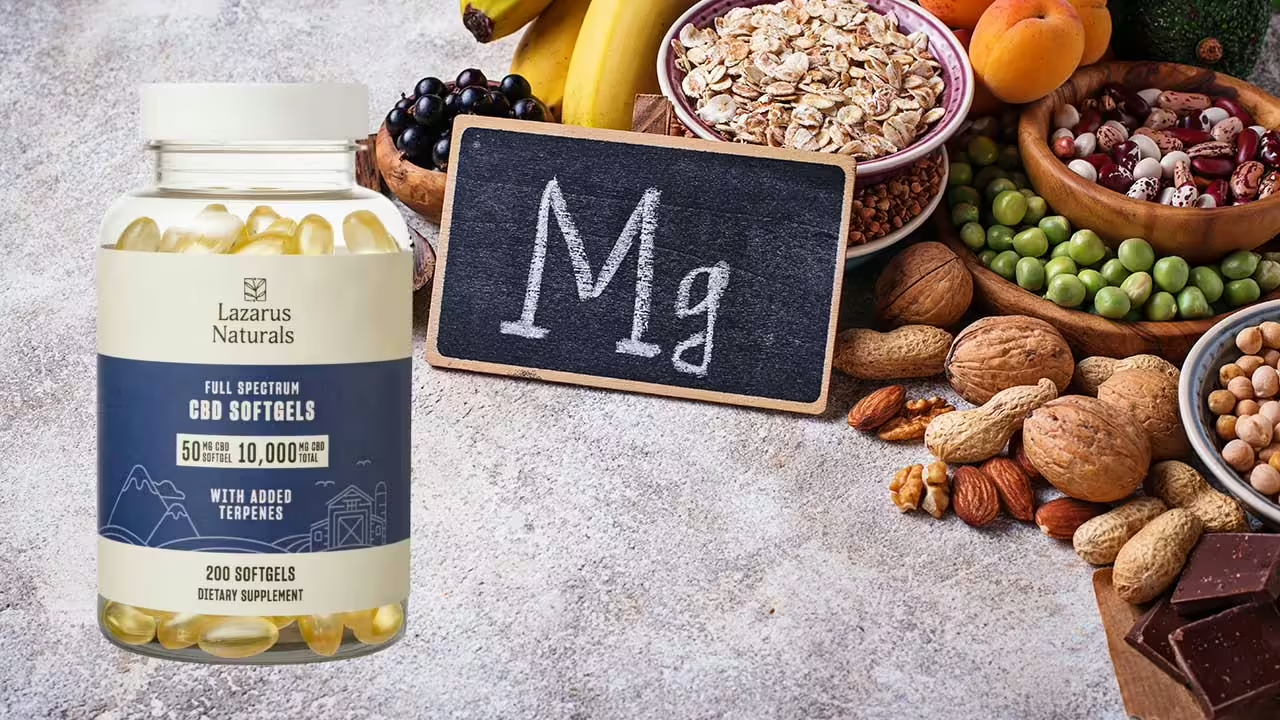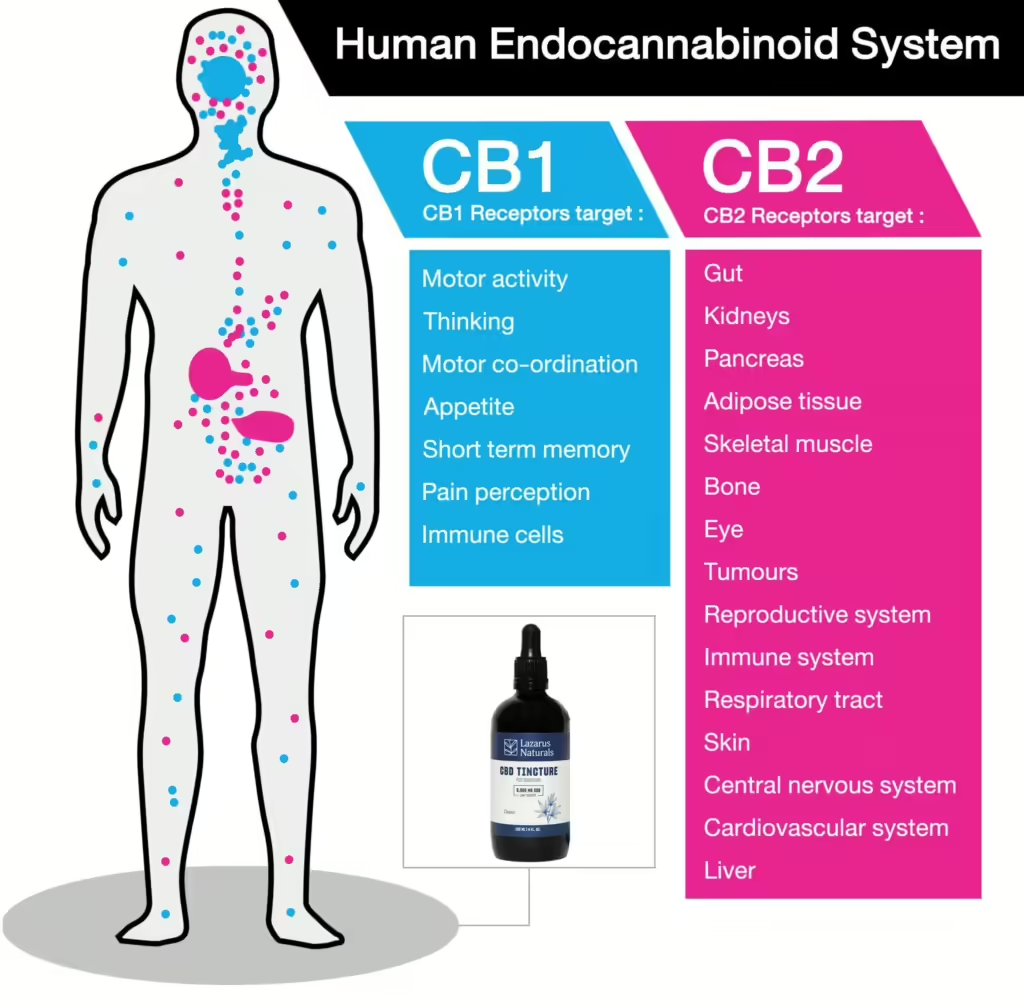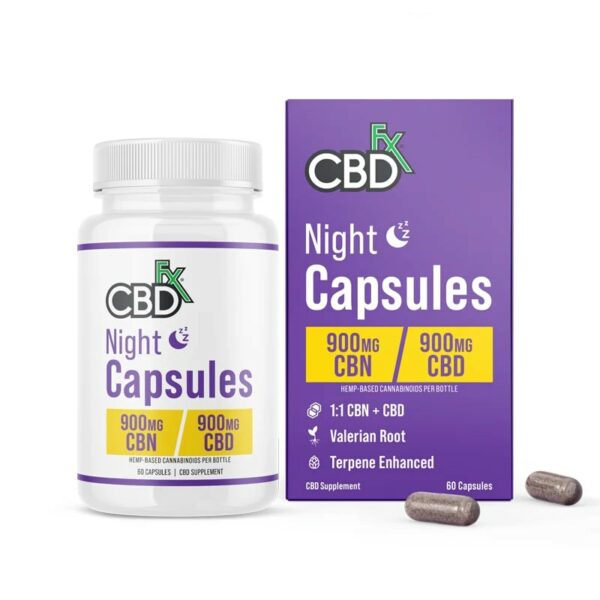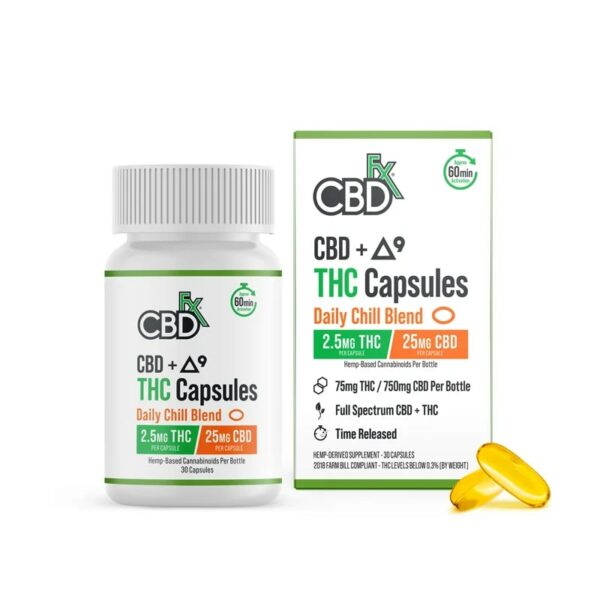CBD and Magnesium Synergetic Benefits
Summarize

The combination of CBD and magnesium has gained attention because of the potential synergistic relationship. Nutrient synergy is the concept that combining two or more nutrients can significantly affect your body more than taking each nutrient separately. The type of synergy depends on the particular nutrients combined. CBD and magnesium glycinate combined may deliver dynamic interactions that enhance the functioning of the nervous and endocannabinoid systems, delivering more potent benefits.

TL;DR (Too Long; Didn’t Read):
CBD and magnesium are combined to enhance each other’s benefits through synergy. The two natural products may enhance mood, improve bone health and sleep quality, and increase energy. The potential effects are due to CBD and magnesium working together in the nervous and endocannabinoid systems, which regulate the body’s systems. An added benefit is that neither CBD nor magnesium makes you feel high.
Table of Contents
What is Magnesium?
Magnesium never seems to get enough attention, yet it has a significant role in maintaining good health. It is a mineral found naturally in the body and in many foods. Magnesium impacts different functions in the body.
- It acts as a co-factor (“helper molecules”) in 300 enzyme systems, regulating reactions in your body and affecting blood pressure, blood glucose, muscle function, and nerve functioning.
- It is needed for energy production.
- It contributes to healthy bone development.
- It synthesizes DNA and RNA.
- It synthesizes glutathione, an antioxidant.
- It transports calcium and potassium ions across cell membranes, supporting nerve impulses, normal heart rhythm and muscle contractions.
There are different types of magnesium supplements, like magnesium glycinate. Magnesium glycinate combines the mineral magnesium with glycine, a non-essential amino acid. Glycine helps magnesium become more absorbable and well-tolerated, making it a preferred choice.
Interaction of CBD and Magnesium with the Endocannabinoid System
Can magnesium make you feel high? Like CBD, magnesium is not psychoactive. Though each nutrient can promote relaxation and calm feelings, they are not intoxicating.
To understand CBD and magnesium synergy, we must know that the endocannabinoid system (ECS) influences the brain’s neuronal synaptic communication (neuron signaling), affecting various biological functions due to nervous system responses and actions.
The endocannabinoid system (ECS) is a signaling network that maintains the body’s homeostasis. It is believed to manage metabolism, cellular functions, and immune responses. The ECS may impact sleep, appetite, and other body functions. It is made of endogenous (naturally occurring) cannabinoids, cannabinoid receptors, and enzymes that are crucial to regulating the ECS’s functions.

As a cofactor of hundreds of enzymes, magnesium synthesizes and breaks down anandamide and 2-arachidonoylglycerol, which are endocannabinoids. This process is believed to modulate endocannabinoid levels. Magnesium may modulate the binding of natural cannabinoids to receptors like CB1 and CB2, producing its effects. For example, magnesium has been shown to have effects that modulate tension responses, and these effects are believed to be partly due to the mineral’s interactions with the ECS.
CBD is also still being researched, but recent research has found relatively recently that CBD has little binding affinity for the CB1 and CB2 receptors in the ECS. Instead, CBD does not bind to the receptors in the same way the natural endocannabinoids usually bind. This affects the activity of non-cannabinoid GPCRs like 5-HT1A (serotonin receptor), ion channels like TRPV1 (regulates heat and body temperature), PPARs (metabolism and gene expression) and more. CB1 receptors are primarily in the brain, but some are found throughout the peripheral and Central Nervous System (CNS) and are involved in perception, calcium channels, neurotransmitter releases and motor control.
So far, researchers have found that CBD does not bind to CB2 receptors but turns them on, triggering immune system activity. More research is needed to determine how this process works.
CBD and Magnesium Benefits
Can you take CBD and magnesium together? The answer is yes. Not only can you take them together, but you may strengthen their effects. Following are some of the CBD and magnesium benefits and potential synergistic effects.
1. Mood
Tension can psychologically impact mood. This is a quality-of-life issue because it affects everything from relationships to work productivity.
Many studies demonstrate that CBD may help promote a sense of calm. One of the research areas involves identifying how CBD interacts with serotonin receptors. Serotonin (5-hydroxytryptamine) supports nerve cell signaling, which regulates mood, emotions, sleep, and other functions. Serotonin is often called the “feel good” hormone because it contributes to mood, focus, relaxation, and happiness. Research has found that CBD may activate the serotonin receptors, leading to a more positive mood.
Magnesium also affects mood regulation through its impact on chemical compounds in the brain. The amount of magnesium in your body has been linked to mood, sleep quality, cardiovascular health and more.

Since CBD and magnesium may improve mood, taking them together can enhance their potential effects.
2. Sleep
Almost 50% of US adults are likely not consuming the amount of magnesium needed for good health. Research has found that magnesium helps you maintain a healthy sleep schedule and get high-quality sleep. CBD has also been found to improve sleep by calming the Central Nervous System (CNS). The amino acid glycine is sleep-promoting, so taking CBD and magnesium glycine can elevate the effects.
3. Bone Health
Approximately 60% of magnesium in the body is stored in bones. Magnesium supports bone-building and parathyroid hormone production, which regulates calcium levels. The cannabinoid receptors CB1 and CB2 are involved in bone and bone homeostasis. Research has found that CBD may improve bone healing through its effects on the endocannabinoid receptors. Combining CBD and magnesium has the potential to support stronger bones.

4. Energy Levels
Magnesium plays a role in maintaining energy levels through several actions. It helps balance calcium, potassium and sodium levels. It is crucial for ATP metabolism (nucleotide providing energy to cells), glycolysis (converts sugar into usable energy) and oxidative phosphorylation (a metabolic process that creates ATP). The ATP metabolism fuels cells with stored energy, supplies energy for muscle contractions and assists with blood circulation, all needed for energy.
CBD affects the endocannabinoid system in many ways, and there are overlapping results. For example, a positive impact on sleep can equate to more energy. CBD is believed to increase dopamine levels by suppressing GABA inhibitors through its interaction with the ECS in the brain. Dopamine is a neurotransmitter like serotonin but promotes wakefulness and motor system functioning, supporting increased energy levels.
Combining CBD and magnesium glycinate also boosts antioxidant levels because both antioxidants improve energy metabolism.
Using CBD and Magnesium
The daily RDA (Recommended Dietary Allowance) of magnesium is 310-320 mg for women and 400-420 mg daily for men. However, you do get some magnesium through foods. Combining CBD and magnesium is a great way to enhance the benefits of both compounds as they work together synergistically.
CBD products that contain magnesium are made with isolate or broad spectrum CBD. They are THC-free, so you get the benefits of CBD and magnesium without any worries about taking THC. There are capsules and sublingual mints available. Following are some points to consider when choosing and using CBD and magnesium products.
- There are various CBD potencies, ranging from 25 mg of CBD per serving to 50 mg of CBD.
- Each product is formulated with magnesium and other ingredients, depending on its focus, i.e., zinc, ashwagandha, kava kava, L-theanine, melatonin, valerian root, GABA, vitamins, and other cannabinoids like CBN, etc.
- Start with a low-potency CBD product to assess how the product affects you before deciding to increase the amount of CBD per serving.
- Follow the brand’s recommended instructions for the best time to consume the capsules or mints. For example, CBD with magnesium for sleep can make you drowsy, so take them before bedtime.
- Only purchase high-quality products produced by a reliable brand.
Review the Certificate of Analysis (COA) to verify that an independent lab has tested the product for potency, cannabinoids, terpenes, and contaminants. Also, check with your doctor before taking CBD and magnesium to verify that the substances are safe to take. Some medications, for example, do not mix well with either CBD or magnesium.
Balanced Effects for Wellness
Since CBD and magnesium positively interact with the nervous and endocannabinoid systems, you can enjoy the synergistic effects of natural substances. For example, magnesium promotes muscle relaxation, and CBD reduces feelings of tension. CBD and magnesium for sleep may improve sleep quality more than either could do alone. Many other natural ingredients added in some products have the potential for even more potent effects. Ashwagandha is an adaptogenic herb that may promote calm, so taking ashwagandha, CBD and magnesium together can make relaxation easier. The body is a wonderfully complex set of systems, and maintaining balance is the key to wellness.
Sources
- https://www.ncbi.nlm.nih.gov/pmc/articles/PMC10600480/
- https://ods.od.nih.gov/factsheets/Magnesium-HealthProfessional/#h14
- https://www.ncbi.nlm.nih.gov/pmc/articles/PMC3481537
- https://www.ncbi.nlm.nih.gov/pmc/articles/PMC8196941/
- https://www.ncbi.nlm.nih.gov/pmc/articles/PMC4789136/
- https://www.frontiersin.org/journals/pharmacology/articles/10.3389/fphar.2018.01259/full
- https://www.ncbi.nlm.nih.gov/pmc/articles/PMC9964491/
- https://www.ncbi.nlm.nih.gov/pmc/articles/PMC6326553/
- https://www.researchgate.net/publication/7507851_Agonistic_Properties_of_Cannabidiol_at_5-HT1a_Receptors
- https://www.ncbi.nlm.nih.gov/pmc/articles/PMC10783196
- https://www.ncbi.nlm.nih.gov/pmc/articles/PMC6326553/
- https://nutritionsource.hsph.harvard.edu/magnesium/
- https://pubmed.ncbi.nlm.nih.gov/32705630
- https://www.ncbi.nlm.nih.gov/pmc/articles/PMC5637834/
- https://ods.od.nih.gov/factsheets/Magnesium-Consumer/
Share this post




0